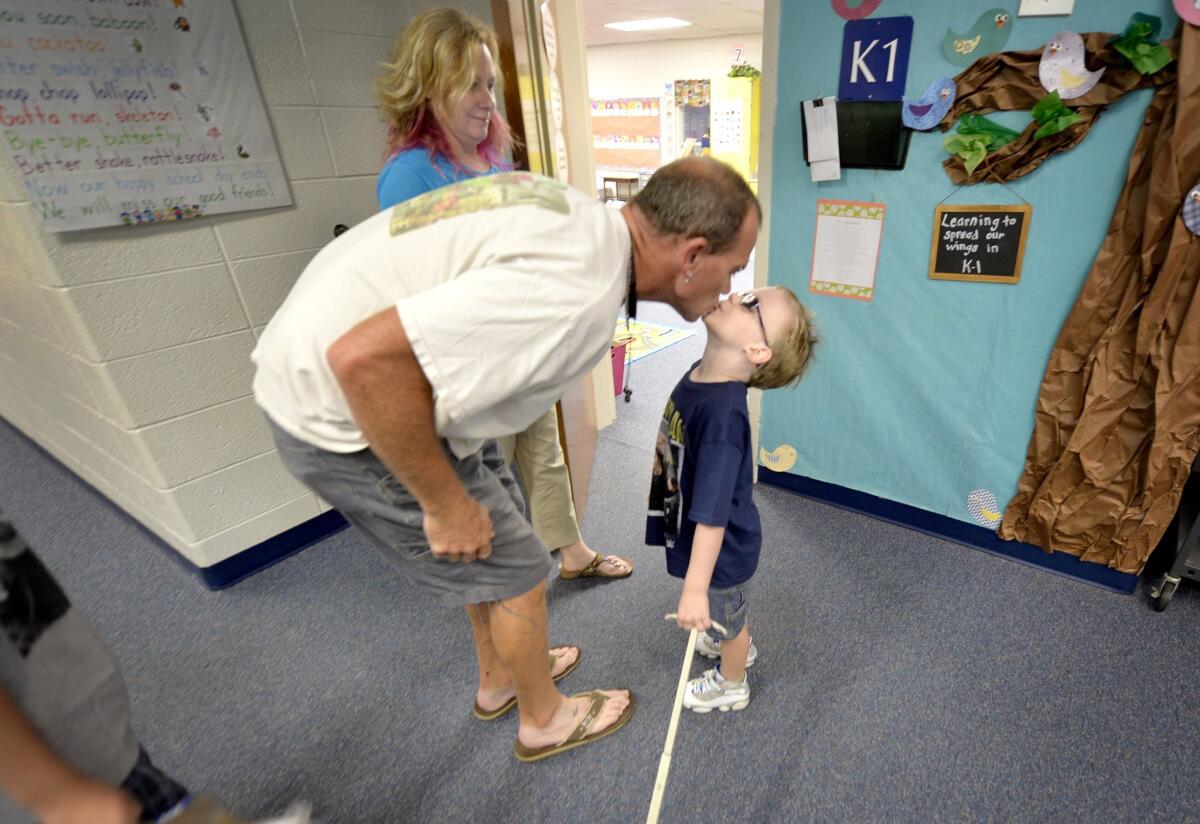Education Matters: How parents and teachers can work together to help kids

Students benefit from parents and teachers communicating well, a new study shows. Shane Warren kisses son Miles, 5, as he drops him off for his first day of school in North Augusta, S.C., as mom DeAnne looks on.
- Share via
In the parent handbook at my kid’s school, there’s a section that talks about telling the school if any “family problem arises that might affect your child’s attitude, performance, or emotional disposition at school.”
Of course, when I met my son’s teachers when school started, I wanted them to know everything possible about my child that would help them reach and teach him. But how much do I really want to share about what’s going on at home?
A recent study explained that there’s a significant disconnect between teachers and parents that could affect our children in school.
Where do you even start to establish a connection with teachers? David Maxfield, vice president of VitalSmarts, the organization that conducted the study, offered some ideas:
Raise your hand. Parents can start now, at the beginning of the school year, to establish and strengthen a relationship with a teacher.
Share with the teacher what you know about your child’s interests, skills and history that will help to build a complete picture of the person your child is at this moment. Share any information that is likely to affect your child emotionally, mentally or physically.
I told the teachers about how my son tracks the planets in the night sky, can’t wait to see the new “Star Wars” movie in December and composes lyrics to impromptu songs.
“You know what makes your child so unique and special,” Maxfield said. “Make sure the teacher knows, too.”
Network. Get the mundane stuff out of the way quickly. Swap contact information and exchange the best times to reach each other.
We’ve received the email addresses for the teachers and for the community’s families. When we met, I confirmed the timing to get a better sense of when to reasonably anticipate responses.
Reach out. Teachers should aim to connect with parents as the school year begins and introduce themselves by sharing their vision of the parent-teacher relationship as a partnership of two-way communication. Report cards and parent-teacher conferences don’t have to be the first point of contact.
We started forging this relationship after a parent orientation held the morning before school started.
Maxfield suggests creating opportunities for parents to come to the school, such as a family academic night, promoted early enough that families can plan to be there.
And parents shouldn’t wait to hear from teachers if they want feedback.
Build a team. Parents, you don’t need to wait for the teacher to tell you there’s a problem, especially if you have a concern. Parents and teachers should create a partnership, focused on creating the best experience and environment for the student.
One minor bump came up for my family just last week, giving us a chance to establish and test that teamwork.
Our son, who is in Transitional Kindergarten, kept coming home with his lunches and snacks absolutely untouched. When we asked him about it, he’d say there just wasn’t enough time to eat. So we reached out via email to the teachers -- to make sure they were aware he wasn’t eating, to find out what the reality on the ground was and to come up with a plan, together.
It turns out they, too, had noticed he wasn’t eating. It was a relief to receive a follow-up note from the teachers that he did nibble some of his lunch the next day.
The solution? They would monitor him more carefully and we’d adjust our lunches to smaller bite-size offerings.
Give gold stars. Parents should remember that a simple thank-you can go a long way in strengthening relationships. And teachers should remember that students aren’t the only ones who respond well to praise. Quick notes to parents with kudos for their kids can build a deepening sense of trust.
And one last thing...
Extra credit: Good communication about your child also should include your child, says Stephen A. Johnson, founder of Bright Minds Tutoring, Inc.
The most important thing to do is to establish a routine of open communication with your kids at home. Do it early and often, Johnson suggests. The keys to communicating with them, he says, are “aspiration and motivation” -- knowing where they want to go or what they want to do and what gets them going.
You can learn a lot about your kid by doing what so many of us did when they were infants -- by observing. At every age and stage, Johnson said, it can help to learn and show interest in what your kids are into, their hobbies, musical preferences.
Building and battling with pool noodle lightsabers with my son shows him that I get his affection for “Star Wars” and encourages him to share more of what he loves and wants to explore. My hope is that doing it now, while his mommy and daddy are still so huge in his world, will create a foundation for trust when his world becomes more expansive and enticing.
Knowing your child, Johnson said, will help you shape a profile of who your child is for teachers.
In talking about being so involved, I asked Maxfield whether there was a danger of becoming too involved, or verging on becoming a helicopter parent, in communicating with teachers.
“Being aware of how your child is doing in school is not helicopter parenting,” Maxfield said. “It’s good parenting.”
How’s back-to-school going for your family? Join me on the journey: @mmaltaisla
More to Read
Sign up for Essential California
The most important California stories and recommendations in your inbox every morning.
You may occasionally receive promotional content from the Los Angeles Times.











